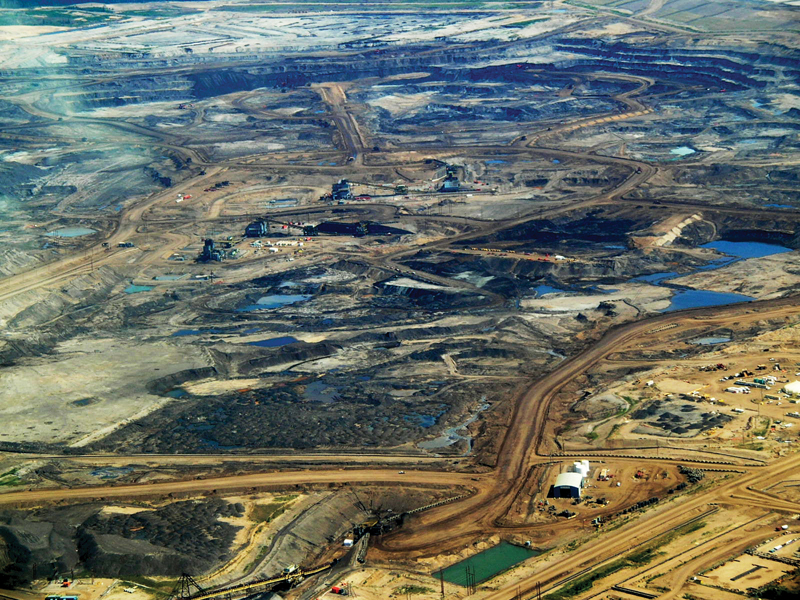Why have the First Nations people of Canada disproportionately developed cancer? Tobacco use? Nuclear waste? While both are good guesses, the answer is actually a nasty form of oil called bitumen. At room temperature, bitumen is as thick and hard as a hockey puck, but it’s full of hydrocarbons that can be refined into oil. Extracting oil from tar sands is very energy-intensive because tar sands are a mixture of sand, water, and bitumen oil; this makes the processing of bitumen release much more greenhouse gas than light crude oil. Bitumen is also mostly found in tar sands in Canada, which infringe on First Nations land and wreak havoc on their water sources and air quality. Breathing in the fumes from dirty energy production can be fatal—in Alberta, a tar sands hotspot, cancer rates among indigenous peoples have skyrocketed by 28 percent in the 30-year period since bitumen production started.
This environmental injustice extends to the United States as well. Due to the high temperatures needed to transport tar sands oil through pipelines, the National Resources Defense Council found that such pipelines spilled 3.6 times more oil than conventional crude pipelines between 2010 and 2012. In 2010, a pipeline operated by Calgary’s Enbridge energy company spilled nearly a million barrels of tar sands oil into the Kalamazoo River, causing evacuations for local residents and resulting in a clean-up effort that remains active today. This tragedy has become the costliest oil spill cleanup in U.S. history. Conventional oil typically floats on water, but tar sands oil tends to sink because it’s so heavy, making it much more difficult to clean up. This is the primary reason why the Keystone XL and Dakota Access pipelines are so contentious. Tar sands pipeline spills are much more damaging than typical oil spills because submerged oil tends to remain in the environment.
Additionally, large, open-air facilities that refine tar sands oil produce a particularly dirty by-product called petroleum coke, more commonly referred to as petcoke, which causes higher than average levels of respiratory and cardiovascular problems when people are exposed to it in the air. Adding insult to injury, petcoke facilities are overwhelmingly located near low-income communities, such as those in Detroit and Chicago.
Georgetown continues to invest part of its $1.5 billion endowment fund in the fossil fuel industry, a primary contributor to climate change and the exploitation of poor communities. The exact investment is unknown, as the university has not been transparent about specifics. Since early 2013, GU Fossil Free (GUFF), a student campaign, has been committed to persuading our university to divest from fossil fuel companies and re-invest in more sustainable companies. Our original proposal to divest from the top 200 coal, oil, and gas companies was rejected by the board of directors in favor of selectively divesting from direct investments in coal. It became apparent that GUFF would have to determine individual types of dirty energy for divestment. Due to the hazards faced by Canada’s First Nations and the exceptionally high contribution to greenhouse gases, tar sands are the target of the latest divestment proposal GUFF submitted to the Committee on Investments and Social Responsibility.
Georgetown says it cares about environmental stewardship and social justice—any first-year out of NSO can tell you that our school is Jesuit and takes pride in shaping “people for others.” Our proposal is an opportunity for the university to live up to that rhetoric. If the board of directors votes yes to divest from the 18 companies outlined in our proposal, the Investment Office would be required to shed all of its shares in tar sands companies. This move would also bar the money managers of our endowment from investing in such companies in the future, signalling a momentous withdrawal of institutional support from tar sands.
More and more student groups are capitalizing on this opportunity to align the university’s values with its actions by formally endorsing GUFF’s proposal. Clubs focused on environmental causes, such as Environmental Futures Initiative, Animalia, Georgetown Sustainable Oceans Alliance, and Georgetown Renewable Energy and Environmental Network have signed on, as well as other social justice groups. Sexual Assault Peer Educators and H*yas for Choice, for instance, support the proposal, as rates of sexual harassment and STIs have been linked to the presence of tar sands oil production. The Georgetown Solidarity Committee backed the proposal because many of the tar sands workers’ immigration statuses prevent them from reporting abuse on the job. The Native American Student Council approved the proposal, recognizing the egregious degradation of First Nations’ health and sacred land as a result of tar sands expansion.
The breadth of these student groups’ causes—among others, listed on GUFF’s Facebook page—represents just how far the ripple effects of tar sands go. There cannot be racial justice without the removal of dirty energy sources from communities of color, whether that’s in Alberta, Canada, or Detroit, Michigan. There cannot be justice in international development without discussion of climate change, which disproportionately affects poor countries without the resources to cope with natural disasters and rising sea levels. It’s time for Georgetown to uphold its values of fighting against injustice and listen to the student body demanding that it do so.






